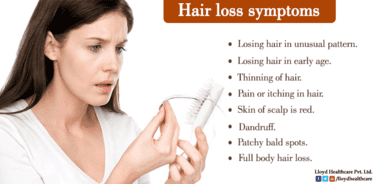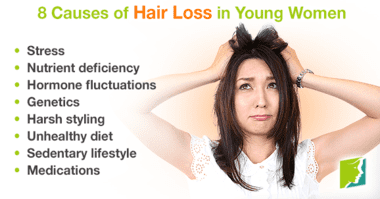Hair Lose Summary
Baldness can impact only your scalp or your whole body. It may be the result of heredity, hormonal changes, medical conditions or drugs. Everyone can experience hair loss. However, it is more prevalent in men. Hereditary baldness with age has become the most frequent reason for baldness. Many folks would instead allow their hair loss run its course untreated and unhidden. And still, others select among the remedies available to stop additional hair loss and to revive growth. Before applying hair loss therapy, speak to your physician about the reason for your hair loss and treatment choices.
Hair Loss Symptoms

Baldness can appear in many distinct ways, based on what’s causing it. It may come on suddenly or slowly and influence just your scalp or your whole body. Some kinds of hair loss are temporary, and many others are permanent.
Signs and symptoms of baldness might include –
- Gradual reduction along with the head. In men, hair often starts to recede in the forehead at a line that resembles the letter M. Women usually retain the eyebrow on the forehead but possess a portion of the element in their hair.
- circular or patchy bald spots. This type of hair loss typically impacts only the entire scalp, however, it occasionally also occurs in beards or eyebrows. In some cases, your skin can also become painful or itchy till the hair falls out.
- Sudden loosening of hair. A physical or psychological shock can cause hair to loosen up. Handfuls of hair can come out when washing or combing your hair or even after gentle tugging. This form of hair loss generally induces overall baldness rather than bald spots.
- Full-body baldness. Some conditions and health care treatments, such as chemotherapy, could lead to the lack of hair throughout your entire body. The hair usually grows back again.
- Patches of scaling that disperse over the scalp. This is a sign of ringworm. It can be accompanied by damaged hair, swelling, redness and, at times, oozing.
Causes

Folks usually lose about 100 hairs a day. This generally does not cause noticeable thinning of scalp hair because green hair is growing at precisely the same moment.
Hair loss is typically associated with one or more of these variables –
-
- Family history (heredity). The most frequent reason for hair loss is a hereditary condition called male-pattern hair loss or female-pattern baldness. It usually happens slowly with aging and at predictable patterns — a receding hairline and bald spots in men and thinning hair in girls.
- Hormonal changes and health ailments. Some illnesses can lead to permanent or temporary hair loss, such as hormonal fluctuations due to pregnancy, childbirth, menopause and thyroid problems. Medical conditions comprise alopecia areata (al-o-PEE-she-uh are-A-tuh), which causes significant hair loss, scalp infections such as ringworm and also a hair-pulling disorder called trichotillomania (trik-o-til-o-MAY-nee-uh).
- Medications and supplements. Hair loss can be a complication of certain drugs, like the ones used for cancer, arthritis, depression, heart issues, arthritis as well as higher blood pressure.
- Radiation remedy to the head. The hair may not grow back similar to it changed into in advance.
- A very stressful event. Lots of folks experience an overall thinning of hair several months following a physical or psychological shock. This type of hair loss is temporary.
- sure hairstyles and remedies. hot oil hair remedies and permanents can purpose irritation of hair follicles that leads to hair loss. If scarring happens, baldness could be permanent.
Risk factors
Lots of factors may increase your risk of baldness, including –
-
- Family background of balding, in either of your parent’s households
- Age
- Significant weight loss
- Certain health conditions, such as diabetes and lupus
- Stress
Prevention

Most hair loss is caused by genetics (male-pattern hair loss and female-pattern hair loss ). This type of hair loss isn’t preventable.
These tips may help you avoid preventable Kinds of baldness –
- Manage the spinned words as you want..
- save you tight hairstyles, which includes braids, buns or ponytails.
- keep away from compulsively twisting, rubbing or pulling your hair.
- Treat your hair softly when washing and brushing. A wide-toothed comb might help prevent pulling out hair.
- Avoid harsh remedies like hot rollers, curling irons, hot oil treatments, and permanents.
- Avoid supplements and medications that might cause hair loss.
- stop smoking. a few studies display an affiliation between smoking and baldness in guys.
- if you are being handled with chemotherapy, then ask your doctor approximately a heating cap. this cap can lower your threat of dropping hair all through chemotherapy.

